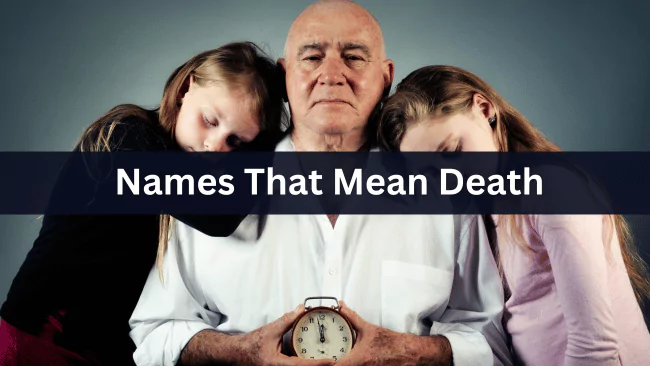Whispered Echoes: Names That Mean Death Around the World

Names that mean death. They connect us to culture, identity, and emotion. Among the most evocative are names that signify death, the most universal of all experiences. While some may view such names as ominous or taboo, others see them as powerful, mystical, and even beautiful. Across mythologies, religions, and societies, names tied to death reflect humanity’s complex relationship with mortality.
This article explores the origins, symbolism, and cultural use of names that mean death. From gods of the underworld to literary figures, these names have shaped art, belief systems, and even modern baby name trends. Whether you’re a writer seeking darkly poetic character names, a linguist curious about etymology, or simply intrigued by the macabre, this journey into the world of death-themed names offers both historical insight and creative inspiration.
Despite the darkness often associated with death, many cultures celebrate it as a part of life—a transition or continuation. Names tied to death often embody this deeper meaning, becoming symbols of transformation, rebirth, and power. Let’s explore how these names are used, understood, and even loved around the world.
The Symbolism of Death in Names
The Duality of Death in Cultural Narratives
Death is rarely viewed in a singular way. In some traditions, it is feared and avoided, while in others, it is embraced as a natural phase in life’s cycle. This duality is often reflected in names. For example, in many African cultures, names associated with death are used to ward off evil spirits or acknowledge the passing of ancestors. In contrast, Western cultures often avoid such names, considering them too morbid or unlucky.
Names that mean death aren’t always about doom; they can represent strength, remembrance, and the sacred. In ancient Greek, the name “Thanatos” wasn’t merely a grim reference—it represented the personification of peaceful death. In Slavic folklore, names related to spirits of death were thought to carry protection and mystical awareness.
Why People Choose or Avoid These Names
Cultural perspectives heavily influence whether death-themed names are embraced or shunned. Some parents may avoid them due to superstition or the stigma of associating a child with death. Yet others may choose them to honor traditions or signify strength. In Gothic subcultures, for instance, names associated with death are often reclaimed as statements of individuality and rebellion.
Names tied to death are also common in spiritual naming ceremonies, especially in shamanic traditions. These names serve not only as identity markers names that mean death but as power symbols, believed to protect the bearer or connect them to ancestral spirits. Avoiding these names can sometimes mean missing out on rich, historical significance.
Death in Etymology: How Meanings Evolve
Over time, the meanings of names can shift dramatically. A name that once meant “death” may evolve into a poetic or metaphorical symbol of change. The Latin root “mort-” (meaning death) appears in names like Mortimer or Morticia, which, over time, have gained cult classic appeal due to literature and film.
Names can also disguise their meanings. For example, the Japanese name “Shinigami” directly means “death god,” but many Western fans of names that mean death anime and manga may use it without fully understanding the gravity of the term in Japanese culture. Understanding the etmological evolution of such names helps us respect their origins and reinterpret them creatively.
Mythological and Religious Names Linked to Death

Names of Gods and Goddesses of Death
Nearly every major mythology includes deities of death, and their names are loaded with meaning. Hades (Greek), Anubis (Egyptian), and names that mean death Hel (Norse) are powerful figures whose names evoke authority, finality, and the unknown. These names have endured through centuries, appearing in literature, pop culture, and even baby name databases.
Anubis, the jackal-headed Egyptian god of mummification and the afterlife, has seen resurgence in popularity in occult and fantasy literature. Hades, once feared, is now a familiar name in video games and animated series, often rebranded with more nuanced personality traits.
Biblical and Scriptural Names Connected to Death
The Bible and other religious texts include many figures whose names are steeped in death symbolism. “Abaddon,” for instance, means “names that mean death” or “angel of the abyss.” Azrael, often considered the angel of death in Islamic and Jewish traditions, has a name that invokes awe and reverence.
These names are rarely used in real-life naming due to their ominous connotations. However, they often appear in literature, horror films, and dark fantasy as character names, adding spiritual weight and historical layers to fictional stories.
Indigenous and Tribal Names Related to Death Spirits
Indigenous and tribal societies frequently reference death in naming, but with more spiritual and respectful undertones. In Native American traditions, death is not feared but acknowledged as a spiritual event. Some names are given names that mean death posthumously or during vision quests where spirits guide the naming process.
In African tribal cultures, names like “Kifo” (Swahili for death) are sometimes used as reminders of ancestral presence. These names are not morbid but powerful, grounding individuals in a long-standing lineage and cosmic connection.
Names That Literally Mean Death in Various Languages
Male Names Meaning Death
Some male names explicitly mean death or derive from words meaning to die. “Thanatos” (Greek), “Moros” (Greek for doom or fate), and “Khalon” (Arabic, sometimes associated with eternal rest) are examples. These names carry heavy meaning and are often used in fantasy literature or spiritual storytelling.
While rare in modern baby naming practices, these names are used to evoke strength, finality, and mystique in character creation or artistic personas. They offer an aura of power and inevitable truth.
Female Names Meaning Death
“Mara” (Slavic for nightmare or death spirit), “Kali” (Hindu goddess of death and time), and “Lilith” (sometimes associated with death and names that mean death chaos in Jewish mythology) are strong feminine names associated with death. Kali, in particular, is a powerful, multifaceted figure who represents destruction and rebirth.
These names are often reclaimed in feminist or artistic contexts, emphasizing transformation, wisdom, and strength, rather than fear. In stories and films, they’re often used for strong, dark, mysterious female characters.
Gender-Neutral or Unisex Names Associated With Death
Names like “Reaper,” “Onyx,” or “Shiva” (in certain interpretations) can be considered gender-neutral death-themed names. “Reaper” evokes the Grim Reaper, while “Onyx,” a black gemstone, symbolizes mourning and the afterlife in names that mean death some cultures.
These names are becoming increasingly common in gaming, art, and online personas, where gender fluidity and symbolic depth are appreciated.
Death-Themed Names in Modern Pop Culture
Names from Literature and Movies
Characters like Morticia Addams, Lord Voldemort, and the Grim Reaper have made death-related names iconic. “Morticia” is derived from “mort,” while “Voldemort” literally means “flight of death” in French. These names carry thematic weight, establishing the character’s role or aura instantly.
Writers frequently use such names to create a sense of fear, mystery, or dark allure, making them memorable and symbolically rich.
Gothic, Dark Fantasy, and Horror Naming Conventions
The Gothic subculture embraces names like Raven, Mortis, and Nocturne. These names are often stylized and symbolic, representing names that mean death alienation, mystery, and mortality. In dark fantasy and horror fiction, death-themed names lend depth to otherworldly characters.
Gamers, authors, and visual artists often choose such names for their symbolism and aesthetic value, linking them to darkness, strength, or transformation.
Death-Inspired Aliases, Pseudonyms, and Usernames
In digital spaces, aliases like “Soulreaper,” “Deadwalker,” or “GrimX” are popular in forums, games, and social media. These names that mean death offer a persona of power or intrigue, often used to signal a darker or more introspective personality.
They’re also part of branding for musicians, artists, and creators in horror, metal, and alternative genres.
Conclusion
Names that mean death are far more than macabre curiosities—they are rich, symbolic, and culturally profound. They tell stories of gods, ancestral reverence, power, transformation, and human fascination with the unknown. From ancient mythologies to digital usernames, death-themed names remain deeply embedded in how we explore our fears, beliefs, and creativity.
Rather than avoiding or fearing them, we can learn from these names—seeing in them a mirror of our deepest truths and eternal names that mean death questions. Whether used for artistic creation, spiritual significance, or linguistic appreciation, they remind us that death, like life, is part of the story worth telling.
FAQs
Q1. Is it bad luck to use a name that means death?
Not necessarily. In many cultures, such names are protective or symbolic rather than ominous.
Q2. Are there cultures where death-related names are common?
Yes. African, Native American, and Hindu traditions often embrace such names for spiritual or ancestral reasons.
Q3. What’s the difference between names that mean death and names of death deities?
Names that mean death describe the concept, while deity names personify it in mythological form.
Q4. Can I use a death-themed name for a story character or brand?
Yes, but be respectful of cultural origins and meanings to avoid misrepresentation.
Q5. Are there soft or poetic versions of names that imply death or endings?
Yes—names like Onyx, Nocturne, and Lilith carry symbolic depth without being explicitly dark.
You May Also Read: https://ventswork.com/lake-texoma-should-be-capitalized/
